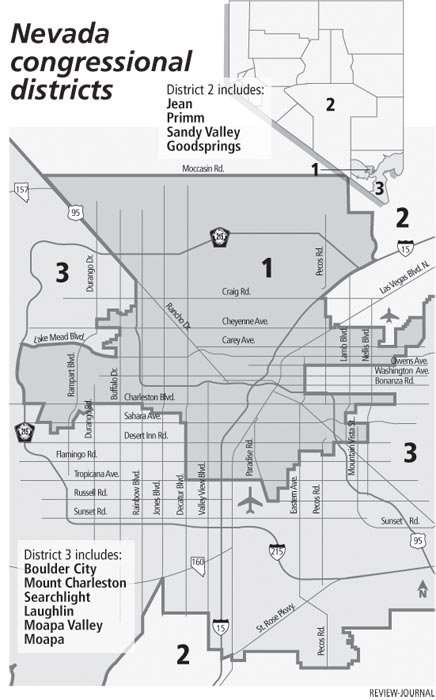3RD CONGRESSIONAL DISTRICT
The 3rd Congressional District, which just two years ago was evenly split between Republicans and Democrats, now contains 43 percent Democrats and 36 percent Republicans, according to the Clark County Election Department.
What that means, according to incumbent Republican Jon Porter, who has held the seat since it was created in 2002 as a result of Nevada's population growth, is that "I've never worked harder to represent my district or campaigned harder for re-election."
The district that rings Las Vegas and sprawls outward to the edges of Clark County is now seen by both major parties as one of the more competitive races in the nation. And it is one of the congressional districts hardest hit by foreclosures -- one of the critical factors in the nation's financial crisis.
Saying it was "the right thing to do" and necessary "to prevent further collapse," Porter was the only Nevada member of Congress to vote for the initial $700 billion bill to shore up the nation's economic system. That measure failed by a vote of 228-205.
Dina Titus, the longtime leader of the state Senate's Democratic minority and Porter's chief challenger for the 3rd District seat, was critical of Porter, saying she wouldn't have voted for a bill that didn't provide regulation "to ensure a similar crisis does not occur again."
Titus, who lost a 2006 bid for governor to Republican Jim Gibbons, said a lack of regulation favored by President Bush, and supported by Porter, has led to the nation's financial meltdown.
Porter, however, said Congress, Democrats and Republicans alike, had for years cut protections to keep the country from suffering from the mismanagement and greed of Wall Street.
"I have done what I felt was best for constituents regardless of the consequences to my reelection," the former insurance executive said following his "yes" vote on the second version of the $700 billion bailout bill, which passed both the House and Senate.
"We don't want to be in a situation where people cannot get loans or businesses can't make payroll."
Titus, a political science professor at the University of Nevada, Las Vegas, said she would have voted for the second version of the bill largely because it included tax credits for renewable energy, extended the Child Tax Credit and ensured families are protected from the Alternative Minimum Tax.
"It is unfortunate that in order to pass these important tax cuts, Congress had to bail out Wall Street in the process," she said.
Porter and Titus also differ on other issues.
Porter says tax incentives for domestic energy production, including those that go to oil companies, should be retained.
Titus would take away tax breaks for big oil companies and give the breaks to renewable energy development instead.
Titus favors timetables to bring troops home from Iraq, while Porter opposes timelines for the war.
Porter wants to extend President Bush's tax cuts, while Titus, who favors a tax cut for the middle class, wants the Bush tax cuts for the wealthiest Americans to expire.
Porter and Titus face competition from four minor party candidates.
Independent American Party candidate Floyd Fitzgibbons, who runs an insurance company, isn't happy with the bailout of Wall Street.
"What we really need to do is let the market correct itself," said Fitzgibbons, who opposes the war in Iraq and favors stronger opposition to illegal immigration.
"Illegal immigrants cost us a lot of money in services," he said.
Libertarian Joseph Silvestri, a teacher in the Clark County School District, said "greedy bankers, with the compliance of our government," have caused the country's shaky financial situation today.
"We need to be fiscally conservative," he said.
Silvestri also believes the country shouldn't be jailing people for nonviolent crimes, including drug possession and prostitution
Not only does that cost money, he said, it also stigmatizes individuals with prison backgrounds and prevents them from getting future employment.
Green Party candidate Bob Giaquinta, a dentist, said his party has well-known positions on alternative energy to address global warming, but many people are unaware of the party's desire to cut back on military spending.
"Military spending has been a huge expense of our government," Giaquinta said. "Why do we need 700 bases in foreign countries? Savings from that can go a long way in helping taxpayers."
Attempts to reach independent candidate Jeffrey C. Reeves for comment were unsuccessful.
Contact reporter Paul Harasim at pharasim@reviewjournal.com or 702-387-2908.
HOUSE DUTIES Members of the U.S. House of Representatives are elected to two-year terms in the lower house of Congress. Their main duties involve passing laws, allocating spending, reviewing the performance of federal agencies and protecting the interests of their states. They are paid $169,300 per year. REVIEW-JOURNAL






















